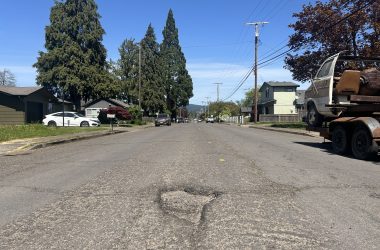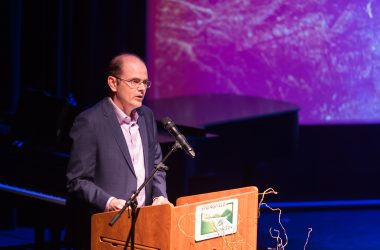Residents of Pleasant Hill and Goshen face a critical decision in the upcoming Nov. 7 Special Election: Do they want new, collaborative fire and emergency services, or are they OK with sticking with the status quo?
Each person faces a vote on three measures. The first two – Measures Nos. 344 and 345 – ask if they want to dissolve the existing fire departments in Pleasant Hill and Goshen. Measure No. 347 asks if they are in favor of combining the two districts, a move that would greatly expand coverage, would include the building of a new firehouse in Pleasant Hill, and would be funded by a permanent tax.
Proponents of the new measure say it makes sense on a multitude of levels in today’s ever-changing landscape. Costs of equipment are skyrocketing and firefighters face more and more challenges virtually every day, particularly here in the Northwest.
Opponents of the bill mostly are against paying more taxes. Proposals show that the median homeowner of a $277,948 home in Pleasant Hill will pay an increase of $25.48 per month, while the average homeowner of a $236,858 Goshen home will face an increase of $9.48 per month.
If the measure passes, the new district can collect $2.20 per $1,000 of assessed property value. The owner of that $277,869 home would now pay about $51 per month. The current rate in Pleasant Hill is $1.10 per $1,000 assessed property value; in Goshen it is $1.72 per $1,000 assessed property value.
“When it comes to taxes, a lot of people don’t even want to talk to you,” Pleasant Hill board member Paul Filson said. “There’s $2,000 that goes directly to the school district, and another $1,000 goes to the bond for the school district. So if you’re somebody in your 70s and don’t have kids, you’re paying $3,000 for schools but you don’t want to pay a fraction of that amount for emergency services?
“That’s why we want to make sure that everyone is getting properly educated about what’s at stake here.”
Terry McDiarmid is a Goshen fire board member after living in Pleasant Hill for 41 years.
“My parents had property in Goshen, so I had to resign my seat in Pleasant Hill last year,” McDiarmid said. “The biggest change for me was that I moved seven miles – and I’m not done remodeling this house.”
There are a total of nine board members. If Measure No. 347 passes, the new board will consolidate down to five members. The proposed district’s board will be on the ballot for this election.
“We are all on the same team, all working toward the same goal,” McDiarmid said.
“We all want to show our unity and show that we believe in these changes,” Filson added. “I hate that we have to consolidate into a five-man board. We have a terrific team of people here.”
If the proposed measure passes, here are some of the advantages that citizens can expect from their fire and emergency services:
• Paid 24/7 staffing in both Pleasant Hill and Goshen communities.
• Two on-duty crews available to respond to calls in the district.
• A dedicated training officer to manage critical organizational areas, such as firefighter/EMT recruitment and training.
• Construction of a new fire station in Pleasant Hill located on existing property.
• Faster response times, in some cases much faster.
• Improved Insurance Services Office (ISO) fire protection ratings in the district.
• Funding for long-term replacement of critical tools, equipment and vehicles, including fire engines.
In addition, 88 homes that previously had no coverage would now be a part of the new Pleasant Hill Goshen Rural Fire Protection District.
The Pleasant Hill fire station on Hwy 58 is a volunteer station that has no sleeping quarters. Built in 1969, it is used primarily to house seven engines and trucks and for firefighters to train. But the trucks and much of the equipment is in dire need of a facelift. In 2018, the Fire Authority was formed, and the two local departments started banding together, but it has not been tax-funded.
Work on the prospective Pleasant Hill firehouse, which is expected to have four bedrooms, would begin as early as the spring of 2024 if the measure passes. Plans call for Pleasant Hill and Goshen to have three full-time staffers – a captain, engineer and firefighter – at all times.
Measure No. 347 has actually been 10 years in the making. The two local fire districts first signed an intergovernmental agreement (IGA) to combine resources, collaborate and share administrative personnel in 2013. The focus then was to serve the community better, and that shared relationship – much like Eugene Springfield Fire, and South Lane County Fire & Rescue (Cottage Grove and Creswell) – is beneficial on many levels.
“Sure, people don’t want their taxes raised,” Filson said. “But with the rising costs of equipment – a new fire engine now costs over a half-million dollars – there has to be a new district formed. And this is our best avenue. People say why not just do a bond, but then we have to come back in five years and ask for more.”
Pleasant Hill/Goshen Fire Chief Andrew Smith said volunteerism is a key component to staffing each station, especially in the future.
“Today, oftentimes, what we have is students who are pursuing this ideally as a career, that want to provide service, that dedicate time to be in the station to do all the things that our career firefighters are expected to do – clean, do the maintenance around the station, service the vehicles, respond to all the emergencies that happen in our community, they want to get the experience,” Smith said.
“Granted, when they get the experience, they’re landing jobs. We celebrate this, even though it’s hard on our organization, but we can’t shut the door on volunteerism. There will always be opportunities for volunteers if you know individuals who are interested. It is very hard, because it’s firefighting, it is a true career that we ask people to do outside of their regular work and family commitments.”
Smith said it’s a constant balancing act, trying to find more volunteers and maintaining a staff that can get the job done properly.
“When we lose them, we have to have more volunteers, so we have a lot of turnover – volunteer staffing dictates what we do each day,” he said. “One person works full time 24-7 each day; we can’t afford to hire more staffing than what we have today.”








